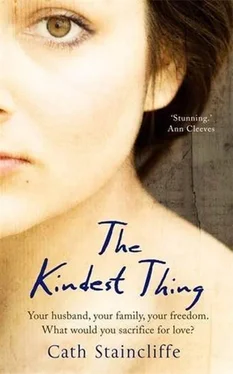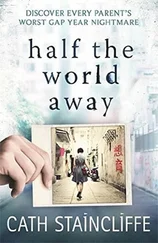‘Yes.’ Oh, those macabre discussions about methods and dosages, cover stories and timing. We went over it again and again. Me rooting out objections, obstacles, dangers. Neil persistently working it through.
Neil had spoken to a counsellor as promised. Now we had to plan his death. Spring was unseasonably warm, that day a cloudless sky. I was supposed to be working on some designs for a new apartment block but I couldn’t settle. I went upstairs to see if he wanted to come down and have lunch in the garden. He liked the idea. Once we’d got him into his shorts and shirt, I helped him to the top of the stairs. There, he lowered himself to the floor. It was easier for him to shuffle downstairs on his bottom, with me yanking his legs or shoving his back when he seized up.
Sophie came in when he was halfway down. ‘You ought to get a stair-lift,’ she said. ‘They said you could get one, didn’t they?’
‘Yes.’ And there was a six-month wait. ‘Yes, I’ll give them a ring.’ Sophie got a text message and before long her friend called round and the two of them went out. Neil and I had lunch, our talk desultory. I cleared the plates and looked out at him. He was settled in the patio in a high-back chair that supported his neck and arms. His face was in repose, his expression reflective. The ache of knowing I was losing him bloomed in my chest. I fetched my camera from the dining room and photographed him from the kitchen window, zooming in to get a closeup.
I took drinks out and joined him. Propped a long straw in his beaker so he could hold it in his lap and still sip it.
‘How?’ The taste of fear made me bark the question. ‘How do you plan to do it? How do we avoid being found out?’
‘An overdose.’
‘There’ll be signs, won’t there?’
‘They won’t necessarily do a post-mortem.’
I shivered in the heat. ‘Neil, I don’t know whether…’
‘Ssh!’ His look was gentle, indulgent, his olive eyes calm.
‘And what do we use, what drugs, how do we get hold of them?’
He didn’t say anything.
‘Could always ask Adam, I suppose,’ I muttered.
Neil laughed and I began to giggle, my anguish punctured. We couldn’t stop and then I was crying too but trying to hide it because I didn’t want to let him down.
‘Might give the game away,’ he said, his chest still heaving.
Rage flared fresh in my belly. It’s not a game! I wanted to scream at him. It’s your life. It’s my life.
I stood up.
‘Where are you going?’
‘The Internet. Marvellous what you can find.’
It wasn’t, as it happens. There was information about the methods used in the Swiss clinics, doses of barbiturates preceded by a strong anti-emetic to stop the person throwing up the drugs. How would we get those? Anti-emetic. Would travel pills help? Sophie always got car sick and we gave her tablets, which seemed to help – but whether they treated the symptom or the cause I’d no idea.
When I typed suicide and overdose into the search engine it threw up everything from paracetamol to heroin.
Rejoining Neil, I told him what I’d read. ‘So we could try a packet of Joy Rides followed by sleeping pills but (a) we’d have to get hold of the stuff first and (b) if they did a post-mortem it’d be an obvious deliberate overdose.’
I felt giddy talking like this, as if in a fever, the garden gleaming in the sun, the scent of cut grass and the bony claws of death crawling up my spine.
‘We need something that could be accidental,’ he said quietly, ‘in case anyone does get suspicious.’
‘Could shove you downstairs.’ I groaned. ‘I can’t believe we’re having this conversation.’
Neil reached slowly across and put his hand on my knee. I turned his hand over, pressed my palm to his, locked fingers, willing him to leave it now, to shut up.
But he carried on: ‘Or something I could have taken myself, without your help, without your knowing. Then, even if it does come out, you’re okay. There’s no risk.’
‘Something you’re already taking?’
‘Would Zoloft work?’ he asked. At that stage he had been prescribed Zoloft for depression.
‘I’m not sure.’
‘Morphine,’ he said. ‘It’s in the breathing kit.’
‘A dose. Not enough to kill you.’
‘Andy Frame will give me some for the pain – the consultant suggested it. It’s also used for breathlessness.’
‘You’re not breathless.’
‘I could be.’ His voice was quiet, delicate.
‘And save it up,’ I said, cottoning on. ‘The syringes-’
‘I think they do liquid, too. To drink. If it’s hard to swallow, to get solids down.’
It seemed so simple. I coveted his equanimity. But there was a backwash of resentment, too, slapping inside me. I gazed at the crimson and yellow splashes of primula, at the buds on the maple. I drank in the sweet, creamy fragrance from the magnolia tree. This, I thought, is what’s hard to swallow. That you want to go and leave me here. You can still talk and laugh and kiss and come. Okay, so we’ll never dance again but you can still breathe and swallow, and yet you want to go.
‘Did you ever consider reneging on your promise?’ Mr Latimer savours the verb though I see Alice’s eyes narrow as she puzzles it out.
‘All the time. I went round and round it in my head, like a maze. I kept hoping he’d die before it came to it. Or he’d change his mind. I dreaded it. I was frightened all the time but I couldn’t see a way out. Most of the time I just pretended it wasn’t really happening. I’d get these panic attacks when I found it hard to breathe, this terrible dread like a paralysis.’
‘Yet you were helping Neil to acquire the medicines you used?’
‘Yes. I thought I was going mad.’
Mr Latimer guides me through the sequence of events, a quadrille of question and answer. Neil’s complaints to Dr Frame and the prescription for liquid morphine. The medicines hidden in his bedside table. One, then the other. More than a month’s supply.
Mr Latimer asks me about the children. I recall one conversation, early evening, Neil in bed resting, me putting clothes away. The banality of it. We’d already agreed to conceal his intention from the children. Knowing how horrific the burden was for me, I could not countenance imposing it on Adam and Sophie. Neil felt the same. It was too much to bear – they were kids.
‘What about afterwards? What do we tell the children?’ I asked Neil.
‘Nothing.’
‘Is that fair?’
He glanced away, then back to me. ‘If we organize it properly, everyone will think I just died sooner than expected. The kids included. If anyone suspects otherwise you could be in trouble. It wouldn’t be fair to ask them to keep that sort of secret.’
I nodded. Neil had redrawn his will and written letters for Adam and Sophie, love letters for them to keep.
At each turn of the dance, Mr Latimer stops to ask me about my state of mind. I tell the court about prowling the house. About the nightmares that waited for me to lower my guard and succumb to sleep. About being unable to share meals because of the way my throat sealed as I raised my fork, nausea gushing through me at the smell of food. How practised I became in hiding my disintegration from the world, from my family, my friends, my clients. Neil was the one who was dying. I was just dropping to bits.
‘On the twenty-sixth of May last year,’ Mr Latimer prompts, ‘there was an incident involving your neighbour Pauline Corby. Can you tell us what happened that day? Perhaps you could start by telling us how Neil’s condition was.’
Dolly perks up, flicking her tongue round, licking her lips. I make a quick assessment of the jury. Half of them have crossed arms, a bad sign, closed, defensive. What they’re about to hear won’t improve matters. What’s important is that they think of me as mad, not bad, and material like this could go either way.
Читать дальше












